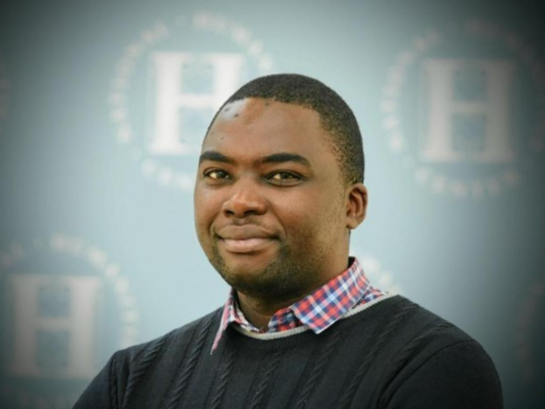(English version below)

CLIC nodigt jullie graag uit voor de eerstvolgende WOLEC-sessie die plaatsvindt op dinsdag 4 februari van 12:00 tot ten laatste 13:30 in 5C03. Spreker Dr. Gibson Ncube (Stellenbosch University) zal een lezing geven met als titel: "Blogging an eco-queer praxis: Keguro Macaria’s 'Gukira: With(out) Predicates'".
Gibson Ncube is Senior Lecturer in de afdeling Moderne Vreemde Talen aan de Universiteit van Stellenbosch. Hij heeft fellowships gehad ondersteund door de Africa Oxford Initiative, het Stellenbosch Institute for Advanced Study, het National Humanities Center (VS) en het Leeds University Centre for African Studies (VK). Hij heeft uitgebreid gepubliceerd op het gebied van vergelijkende literatuur, gender- en queerstudies, evenals culturele studies. Hij was mede-organisator van de Queer African Studies Association (2020-2022) en was de Mary Kingsley Zochonis Distinguished Lecturer (African Studies Association UK) in 2021. Momenteel zit hij in de redactieraden van de volgende tijdschriften: Journal of Literary Studies, de Canadian Journal of African Studies, de Nordic Journal of African Studies, en Imbizo: International Journal of African Literary and Comparative Studies. Hij is momenteel hoofdredacteur van het South African Journal of African Languages en tevens de redacteur voor Franse boekrecensies van de Canadian Journal of African Studies.
De voertaal is het Engels. Een broodjeslunch wordt voorzien. We vragen u om uw aanwezigheid ten laatste tegen 28 januari via deze link te bevestigen. Voor meer informatie over WOLEC, klik hier.
Hopelijk tot dan!
*****
CLIC is excited to invite you to the next WOLEC session, taking place on Tuesday 4 February from 12:00 till 13:30 in room 5C03. Dr. Gibson Ncube (Stellenbosch University) will give a lecture titled: "Blogging an eco-queer praxis: Keguro Macaria’s 'Gukira: With(out) Predicates'".
Gibson Ncube is a Senior Lecturer in the Department of Modern Foreign Languages at Stellenbosch University. He has held fellowships supported by the Africa Oxford Initiative, Stellenbosch Institute for Advanced Study, the National Humanities Center (USA) and Leeds University Centre for African Studies (UK). He has published widely in the fields of comparative literature, gender and queer studies as well as cultural studies. He co-convened the Queer African Studies Association (2020-2022) and was the 2021 Mary Kingsley Zochonis Distinguished Lecturer (African Studies Association UK). He currently sits on the Editorial Boards of the following journals: Journal of Literary Studies, the Canadian Journal of African Studies, the Nordic Journal of African Studies as well as Imbizo: International Journal of African Literary and Comparative Studies. He is currently the Editor-in-Chief of the South African Journal of African Languages and also the French Book Review Editor of the Canadian Journal of African Studies.
The lecture will be held in English. A sandwich lunch will be provided. We ask you to confirm your presence via this link by 28 January. For more information about WOLEC, click here.
We hope to see you there!
Abstract

This paper examines Keguro Macharia’s blog, Gukira: With(out) Predicates, as a site where gardening is an important practice of thinking through not just what it means to be queer in Africa, but importantly what it means to be human in the face of escalating ecological crises. Through his reflection on gardening, Macharia reimagines kinship beyond heteronormative frameworks and envisions care (for humans and non-humans alike) as an ecological and social responsibility that transcends conventional boundaries. In the way in which he weaves personal narratives with broader considerations of ecological disasters and human vulnerability, Macharia offers a speculative praxis for rethinking belonging, agency, and interdependence. Drawing on Macharia’s 2013 article “Blogging queer Kenya”, I attempt to situate blogging as a minor literary form as exemplified in Gukira within the intersecting fields of queer theory, environmental humanities, and African studies to argue that Macharia’s blogging speaks to a transformative ethics of care that challenges anthropocentric and exclusionary paradigms, offering a vision of kinship grounded in mutual flourishing across the diversity of human and non-human lives.
